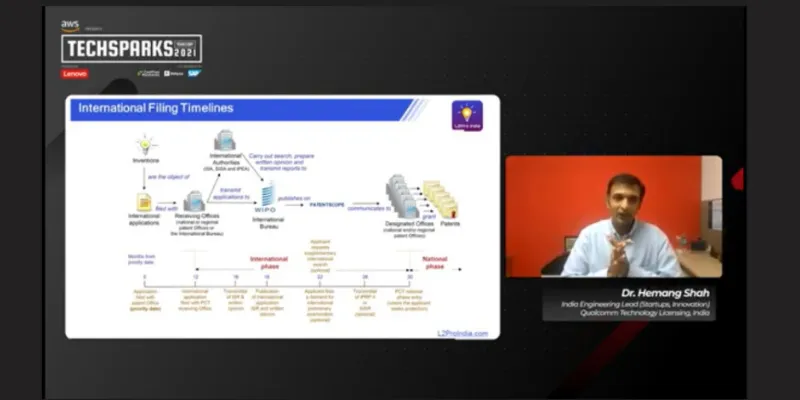IPs are relevant for tech startups: Hemang Shah on startups learning to protect, secure, and maximise their innovations
During an insightful masterclass at TechSparks 2021, Hemang Shah, India Engineering Lead (Startups, Innovation) Qualcomm Technology Licensing, India, deep-dived into the importance of IP for businesses and the variations of IPs relevant for tech startups.
Intellectual Property (IP) is the buzzword these days in the startup sector. Startups trying to bridge the market gap in a particular sector formulate their unique take on the product, thereby giving a shape to their innovations. And, there are a host of opportunities to create intellectual properties.

During an insightful masterclass at TechSparks 2021 — YourStory’s flagship technology, innovation, and leadership summit — Hemang Shah, India Engineering Lead (Startups, Innovation) Qualcomm Technology Licensing, India, deep-dived into the importance of IP for businesses and the variations of IPs relevant for tech startups.
IP’s role in business growth
Hemang said the primary advantage of IP is to restrict competitors from copying their original ideas.
He added, “These days, a good investor inquires whether the startup’s technology is backed by an IP. In case you are seeking ways of increasing your funds or valuation, you cannot ignore the IP forming a major part of your assets.”
Moreover, there are marketing benefits of having IP in startups’ products for them to cross collaborate with other startups and companies using their IP. Businesses can also monetise their IP strategies and earn revenue by transacting through an assignment or license.
“An important thing remains that if anyone has unauthorised dues of your IP, you can take legal actions immediately,” said Hemang.
IP strategies can have two views: offensive (the technology adds certain values and would be beneficial if shared with others) and defensive (the owners want to make sure that they are protected).
“It’s not binary open, where you can choose either of the two. In reality, it’s a mix of both the strategies,” he added.
The Government of India has several categories of IPs, including industrial designs, patents, trademarks, trade secrets, GI, plant varieties, and copyright and related rights.
Classifying IPs
Copyright protects artistic expressions. Although everyone is solving the same equation, the coding must be different. That’s where copyright comes into the tech space.
“You might be expressing your ideas through PowerPoint slide decks or apps, and the entire content is protected through copyright,” said Hemang.
In fact, affixing the product with the copyright symbol might deter unauthorised copying by others.
Trademarks protect the brand identities. For instance, certain products are known to consumers with certain images or symbols they use.
In the startup ecosystem, the company’s name can be different from the product or service names. Owners might consider filing trademarks for both of them, which differentiates the company from its competitors.
“It’s like associating consumers with the company or product’s brand value, or maybe both,” he said.
Industrial designs protect the look, feel, and design of the product, and play a major role in clarifying the originality of the design.
The patent is an exclusive right given to the inventors, allowing them to protect their invention while restraining others from using it without permission.
Criteria for acquiring patents include novelty (an invention not previously or externally disclosed), obviousness (not obvious to what is already known), utility (to be beneficial to people at large), and fully described (to be able to reproduce the invention by following the patent application document).
“Following the above four would certainly be beneficial in overcoming the difficulties and would be beneficial to the community at large,” added Hemang.
Patent rights last for 20 years from the date of filing and can be used in the public domain post that.
Explaining the National Patent Offices, Hemang said, “They act as a repository of information relating to patent applications. So, you can hit their website and search for all the patents granted and also the ones in the application phase. The patent offices also evaluate the inventions for patentability.”
Talking about Provisional Specification, he said, “Imagine if tomorrow, you opt for a large presentation with several attendees on a large scale, your work will act as prior art against you. Before attending this, you might file for provisional specification. Loosely put, it’s like filing a rough draft before you present the real one, and this provisional time saves you.”
“They [patent office] might highlight certain objections based on their evaluations of patentability. After a few back and forth responses, you might reach the final stage, where your patent might get rejected or accepted,” he said.
Patents are territorial. If the patent application is filed and granted in India, its rights will only be valid in India. However, as a way out, individuals can always apply for a Patent Application Treaty, which governs the international patent system, enabling inventors to file a single application for several countries.
“You might think your product is going to follow a particular approach today. However, technology is dynamic, and your market adoption might be different. So, a few years from now, your view towards a particular product might be different. This period gives you the validation of whether your patent is worth protecting in all the applied countries. Also, you can use this time to arrange funds for firing your patent applications in those countries,” explained Hemang.
Startup schemes in India
The Indian government has introduced a Facilitating Startups Intellectual Property Protection (SIPP) that covers a few areas.
For instance, if a startup is filing for a patent application, it is evaluated on a fast track basis. Besides, startups can also get an 80 percent reduction in patent filing fees, which includes IP facilitators working on the trademark and patent filing.
IP facilitators are involved with the government and work for the startup’s IP application. In fact, these facilitators are featured in the Startup India portal.
To log in to our virtual events platform and experience TechSparks 2021 with thousands of other startup-tech enthusiasts from around the world, join here. Don't forget to tag #TechSparks2021 when you share your experience, learnings and favourite moments from TechSparks 2021.
For a line-up of all the action-packed sessions at YourStory's flagship startup-tech conference, check out TechSparks 2021 website.

Edited by Suman Singh








